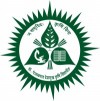About Department
Department of Irrigation and Drainage Engineering was established during the year 1992. It offers M. Tech. (Agricultural Engg.) in Irrigation and Drainage Engg. degree with intake capacity of five students every year excluding ICAR nominees. It also offers Ph. D. (Agricultural Engg.) in Irrigation and Drainage Engg. degree with intake capacity of three students every year.
Dr. Panjabrao Deshmukh Krishi Vidyapeeth, Akola was established in the year 1969 with mandate of agricultural education, research, extension education and seed production. The department of Irrigation and Drainage Engineering looks after the education, research and extension related to irrigation and drainage engineering. The rainfall in vidarbha varies from 700 to 1300 mm. It is more in eastern Vidarbha than western Vidarbha. The percent irrigated area of vidarbha is 11%, but it is very less in western vidarbha. So the main focus is on research and extension so as to have better water management practices with perspective of more crop per drop. Various water saving techniques like micro-irrigation are demonstrated to farmers. The department has till now produced 90 M.Tech. students and 04 Ph.D. students.
Academic Programmes
- M. Tech. in Irrigation and Drainage Engineering with intake capacity 05
- Ph.D. in Irrigation and Drainage Engineering with intake capacity 02
M. Tech Courses
- Core Courses – Total Credits – 21
- Minor Courses – Total Credits – 09
- Supporting Courses – Total Credits – 06
- Research – Total Credits – 20
- Seminar – Total Credits – 01
| Sr. No. | Course No. | Course Title | Credits |
|---|---|---|---|
| Major | |||
| 1 | IDE-501 | Open Channel Flow | 3 (3+0) |
| 2 | IDE-503 | Agricultural Drainage Systems | 3 (2+1) |
| 3 | IDE-511 | Introductory Hydroinformatics | 3 (2+1) |
| 4 | IDE-502 | Design of pressurized irrigation system | 2 (1+1) |
| 5 | IDE-508 | Water resources system engineering | 3 (3+0) |
| 6 | IDE-512 | Aerodynamics of evapotranspiration | 3 (2+1) |
| 7 | IDE-504 | Ground Water Engineering | 3 (2+1) |
| 8 | IDE-592 | Special Problem | 1 (0+1) |
| Total | 21 (15+6) | ||
| Minor | |||
| 9 | STAT-511 | Statistical Methods for Applied Sciences | 3 (2+1) |
| 10 | SWCE-509 | Fluvial hydraulics | 3 (2+1) |
| 11 | STAT-512 | Experimental Design | 3 (2+1) |
| Total | 9 (6+3) | ||
| Supporting | |||
| 12 | BSCT 502 | Computer Languages for Engineering Applications | 3 (1+2) |
| 13 | BSCT-501 | Computer Graphics | 3 (2+1) |
| Total | 6 (4+2) | ||
| 14 | IDE-599 | Master’s Research | 20 (0+20) |
| 15 | IDE-591 | Master’s Seminar | 1 (0+1) |
| Non Credit Compulsory Courses | |||
| 16 | PGS-501 | Library and Information Services | 1 (0+1) |
| 17 | PGS-504 | Basic Concepts in Laboratory Techniques | 1 (0+1) |
| 18 | PGS-502 | Technical writing and communication skills | 1 (0+1) |
| 19 | PGS-503 | Intellectual property and its management in Agriculture | 1 (1+0) |
| 20 | PGS-505 | Agricultural Research, Research Ethics, and Rural Development Programme | 1 (1+0) |
| 21 | PGS-506 | Disaster Management | 1 (1+0) |
Ph.D. Courses:
- Core Courses – Total Credits – 16
- Minor Courses – Total Credits – 09
- Supporting Courses – Total Credits – 05
- Research – Total Credits – 45
- Seminar – Total Credits – 02
| Sr. No. | Course No. | Course Title | Credits |
|---|---|---|---|
| Major | |||
| 1 | IDE 601 | Advanced Hydromechanics in Soil Aquifer Systems | 3 (3+0) |
| 2 | IDE 609 | Advances in GIS and Remote Sensing for Land and Water Resources Management | 3 (2+1) |
| 3 | IDE-602 | Advances in Irrigation and Drainage | |
| 4 | IDE-605 | Pipe Network Analysis | 3 (2+1) |
| 5 | IDE-606 | River Basin Model | 3 (1+2) |
| 6 | IDE-693 | Special Problem | 1 (0+1) |
| 7 | IDE-694 | Case Study | 1 (0+1) |
| Total | 16 (10+6) | ||
| Minor | |||
| 8 | AE 603 | Research Techniques | 3 (2+1) |
| 9 | AE 601 | Environmental impact analysis | 3 (1+2) |
| 10 | AE-602 | Climate change impact, adaption and mitigation | 3 (2+1) |
| Total | 9 (5+4) | ||
| Supporting | |||
| 11 | BSCT 601 | Object Oriented Programming | 3 (2+1) |
| 12 | STAT 601 | Operational Research | 2 (1+1) |
| Total | 5 (3+2) | ||
| 13 | IDE-599 | Doctoral Research | 45 (0+45) |
| 14 | IDE 691 | Doctoral Seminar I | 1 (0+1) |
| 15 | IDE 692 | Doctoral Seminar II | 1 (0+1) |
| Non Credit Compulsory Courses | |||
| 16 | PGS-501 | Library and Information Services | 1 (0+1) |
| 17 | PGS-504 | Basic Concepts in Laboratory Techniques | 1 (0+1) |
| 18 | PGS-502 | Technical writing and communication skills | 1 (0+1) |
| 19 | PGS-503 | Intellectual property and its management in Agriculture | 1 (1+0) |
| 20 | PGS-505 | Agricultural Research, Research Ethics, and Rural Development Programme | 1 (1+0) |
| 21 | PGS-506 | Disaster Management | 1 (1+0) |
Infrastructure Facilities
Following laboratories are set up in the department
| Laboratories | Size (m x m) |
|---|---|
| 1. Irrigation Engineering Laboratory | 9.8 x 11.0 |
| 2. Drainage Engineering Laboratory | 9.1 x 9.7 |
| 3. Fluid Mechanics Laboratory | 2.7 x 16.3 |
List of laboratory equipments with their use
| Sr. No. | Name of equipment | Use |
|---|---|---|
| 1 | Bernoulli’s Theorem Apparatus | Verification of Bernoulli’s Theorem |
| 2 | Raynold’s apparatus | Demonstration of streamlined and turbulent flow |
| 3 | Apparatus for determination of losses in pipe lines due to sudden enlargement, contraction, bends, elbows, etc. | To determine losses in pipe lines due to sudden enlargement, contraction, bends, elbows, etc. |
| 4 | Hydraulic ram | To determine efficiency of hydrum |
| 5 | Venturi meters | To determine coefficient of discharge |
| 6 | Venturi flume apparatus | To measure discharge |
| 7 | Double ring infiltrometer | To measure infiltration rate |
| 8 | Current meter | To measure flow velocity |
| 10 | Screw auger | To take soil sample |
| 11 | Post hole auger | To take soil sample |
| 12 | Electric oven | To dry soil sample |
| 13 | Electric balance | To weigh soil sample |
| 14 | Water analysis kit | To determine characteristics of water such as pH, EC etc |
| 15 | Water resistivity meter | To explore ground water |
| 16 | Water measuring structures | To measure flow discharge |
| 17 | Water meter | To measure flow discharge |
| 18 | Moisture meter | To measure soil moisture content |
| 19 | Gypsum blocks | To measure soil moisture content |
| 20 | Tensiometers | To measure soil moisture content |
| 21 | Aquaterr moisture probe | To measure soil moisture content |
| 22 | Cut throat flume | To measure flow discharge |
| 23 | Open pan evaporimeter | To measure evaporation |
| 24 | Stop watch | To measure time |
| 25 | Point gauges | To measure water level |
| 26 | Raingun | To sprinkle the water like rain in the field |
| 27 | Filters – Screen, Disc, Sand filter | To filter the water in micro-irrigation system |
| 28 | Fertilizer tank | To insert the fertilizer in micro-irrigation system |
| 29 | Ventury set | To insert the fertilizer in micro-irrigation system |
| 30 | Sand Tank Model | To determine drainable porosity |
Mandate
- To undertake various courses related to Irrigation and Drainage Engg. for B. Tech. (Agril. Engg.) and M. Tech. (Irrigation and Drainage Engg.) students.
- Carry out need base research related to Irrigation and Drainage Engg.
- Monitor the research work carried out at various projects / farms related to Irrigation and Drainage Engg.
- Publication in research journals, krishi patrika and news papers.
- Training of departmental officers and youths.
- Participation in symposiums, seminar, exhibitions, shivar pheris, krishi melawas, charcha satras, consultancy project/schemes, services to the other departments and farmers.
- Consultancy projects/schemes/services to the other department and farmers.
- To develop Human Resource Development for Industry/ State Deptt. / Private organization.
Research Activities
Thrust area
Education –
- Strengthening of M. Tech (Irrigation and Drainage engineering) programme with increase in its intake capacity.
- Strengthening of Department Laboratories with modern and precision instrumentation and furniture.
- Starting scheme for higher training to teachers in India and abroad.
- Starting doctoral programme.
- QIP for teaching staff.
- Strengthening the department by getting sanction for additional teaching, technical and ministerial staff for post graduate and doctoral programme.
- Publication of practical journals/books etc.
Research –
- Starting a center for studying advances in micro irrigation.
- Strengthening the present research programme in line of –
- Economical design of micro irrigation systems
- Economical design of farm drainage systems
- Drip irrigation on canal water
- Controlling water logging and salinity
- Reclamation of problematic soil
- Conjunctive use of poor quality ground water and canal water
- Utilization of waste water for irrigation
- Aquatic weed control in water reservoirs and conveyance
- Development and testing of useful equipment/instrumentation
- Evaporation control from water reservoirs.
- Use of satellite remote sensing in irrigation water management
Extension Education –
- Popularization of developed and tested equipments and technologies to the farmers through media/exhibition/ melawa etc.
- Publication of handouts, bulletins, books etc.
- Offering consultancies to Govt. department/ Banks/ private organizations/ co-operative societies/ Industry/ farmers.
- Farmer’s participation in irrigation management.
Topics of Educational Research (during last five years)
M. Tech.
| Sr. No. | Name of Scholar | Title of thesis | Name of guide | Year of submission |
| 1 | Ku R.V.Meshram | Prediction of reference evapotranspiration using artificial neural network. | Dr. M. M. Deshmukh | 2013 |
| 2 | S. B. Rathod | Partical size distribution for micro irrigation filter performance. | Dr. A. N. Mankar | 2013 |
| 3 | Ku M. V. Kawale | Modification of Hargreavos Samani equation for the assessment of reference evapotranspiration in Maharashtra. | Dr. S. B. Wadatkar | 2013 |
| 4 | P. B. Patil | Comparative performance of cropwat and criwar software for scheduling irrigation under Wadi –Adampur distributory of wan river project. | Dr.M.U.Kale | 2013 |
| 5 | S. D. Patil | Effect of different irrigation schedules on wheat productivity. | Dr. M. M. Deshmukh | 2013 |
| 6 | P. V. Jadhao | Effect of open pan evaporation based irrigation scheduling on growth and yield of wheat. | Dr. M. M. Deshmukh | 2013 |
| 7 | Saranya J. | Effect of plastic mulch on yield of tomato under drip irrigation. | Dr. S. B. Wadatkar | 2014 |
| 8 | R. P. Burghate | Effect of mulching on growth and yield of chilli under drip fertigation. | Dr. M. M. Deshmukh | 2014 |
| 9 | P. N. Dalavi | Modeling evaporation farm pond in semiarid region. | Dr. A. N. Mankar | 2014 |
| 10 | J. N. Lokhande | Impact of polyethylene mulch on irrigated cabbage production. | Dr.M.U.Kale | 2014 |
| 11 | G. S. Pawar | Validation of aquacrop model for irrigated cabbage. | Dr.M.U.Kale | 2014 |
| 12 | Ku K. A. Ghate | Impact of polythelene mulch on drip irrigated Bitter Gourd production. | Dr.M.U.Kale | 2015 |
| 13 | Ku P.V.Deshmukh | Response of tomato polyethylene mulch under drip fertigation. | Dr. S. B. Wadatkar | 2015 |
| 14 | R. A. Pachore | Performance of wheat under different IW/CPE ratio. | Dr. M. M. Deshmukh | 2015 |
| 15 | V. A. Bhadane | Response of chilli to polyethylene mulching under drip fertigation. | Dr. M. M. Deshmukh | 2015 |
| 16 | Ku K. P. Giri | Response of cluster bean to irrigation and nitrogen levels under micro sprinkler. | Dr. A. N. Mankar | 2015 |
| 17 | M. A. Sankpal | Performance of tomato under polyethylene mulch and drip fertigation. | Dr. S. B. Wadatkar | 2016 |
| 18 | S. N. Gade | Chilli productivity under drip fertigation with polyethylene mulching. | Dr. M. M. Deshmukh | 2016 |
| 19 | Ku A. S. Talokar | Field verification of aqua crop results for irrigated tomato. | Dr.M.U.Kale | 2016 |
| 20 | G. A. Kayande | Response of drip irrigated bitter gourd to polyethylene mulch. | Dr.M.U.Kale | 2016 |
| 21 | Ku Sonali Chavhan | Validation of aqua crop model for irrigated bitter gourd. | Dr. A. N. Mankar | 2016 |
| 22 | Ku A. U. Kadam | Application of ICT to improve water use efficiency. | Dr.M.U.Kale | 2017 |
| 23 | Ku P. S. Pawar | Estimation of agriculture land drainage coefficient for vidarbha region. | Dr. M. M. Deshmukh | 2017 |
| 24 | A. N. Gaupale | Effect of polyethylene mulch and drip fertigation on production of chilli crop. | Dr. M. M. Deshmukh | 2017 |
| 25 | A. A. Shelke | Response of okra to drip fertigation under polyethylene mulching. | Dr. S. B. Wadatkar | 2017 |
| 26 | Ku. D. A. Patil | Response of onion to crop geometry and fertilizer levels under drip fertigation. | Dr. A. N. Mankar | 2017 |
Ph. D.
| Sr. No. | Name of Scholar | Title of thesis | Name of guide | Year of submission |
| 1 | Ku Sukeshni Wane | Assessment of improved irrigation scheduling using hydrodynamic modeling. | Dr.M. B. Nagdeve | 2013 |
| 2 | M. U. Kale | Integrated storage-based optimized planning for major irrigation projects | Dr.M.B. Nagdeve | 2014 |
| 3 | A. R. Pimpale | Multispectral vegetation indices-based crop coefficients for irrigation water management. | Dr.S.B. Wadatkar | 2014 |
| 4 | Ku R. V. Salunkhe | Optimization of irrigation schedules for capsicum under protected and open cultivation | Dr.S.B. Wadatkar | 2017 |
Extension Activities and Achievements
- Training programmes organized for farmers/women/rural youth etc with best 4 HD quality photographs: provide list of last five years
- Manuals/bulletins published: provide list of publication of last five years
- Text Books and Manual: provide list of publication of last five years in English (published in local/English language with 2-3 best photo of cover page of book or manual)
Research Recommendations (Approved in AGRESCO)
1. It is recommended to use drainage coefficients given in following table for designing agricultural drainage systems for different districts of Vidarbha region.
| Name of crop | Basic infiltration rate, (mm/hr) | Drainage coefficient (mm/day) | ||||||||
| Amravati | Buldana | Washim | Yavatmal | Wardha | Gondia | Bhandara | Chandrapur | Gadchiroli | ||
| Vegetables | 1
2 3 4 5 |
83.46
59.46 35.46 11.46 — |
80.60
56.60 32.60 8.60 — |
78.63
54.63 30.63 6.63 — |
94.84
70.84 46.84 22.84 — |
97.74
73.74 49.74 25.74 1.74 |
108.88
84.88 60.88 36.88 12.88 |
103.03
79.03 55.03 31.03 7.03 |
119.42
95.42 71.42 47.42 23.42 |
102.71
78.71 54.71 30.71 6.71 |
| Oil seed crops | 1
2 3 4 |
41.64
17.64 — — |
50.88
26.88 2.88 — |
48.93
24.93 0.93 — |
55.55 31.557.55— |
56.02
32.02 8.02 — |
76.37
52.37 28.37 4.37 |
58.24
34.24 10.24 — |
72.59
48.59 24.59 0.59 |
66.81
42.81 18.81 — |
| Cotton, Sorghum, Maize, Bajra and other similar crops | 1
2 3 |
26.09
2.09 — |
37.49
13.49 — |
30.59
6.59 — |
34.27
10.27 — |
34.71
10.71 — |
54.31
30.31 6.31 |
45.22
21.22 — |
52.01
28.01 4.01 |
48.29
24.29 0.29 |
2. It is recommended to use mean weekly reference evapotranspiration given in following table for determining water requirement of different crops at Akola and Nagpur districts of Vidarbha region.
| SMW | Dates | Reference Evapotranspiration (ETo), mm/day | SMW | Dates | Reference Evapotranspiration (ETo), mm/day | ||
| Akola | Nagpur | Akola | Nagpur | ||||
| 1 | 1-7 Jan | 3.0 | 3.0 | 27 | 2-8 | 5.2 | 4.4 |
| 2 | 8-14 | 3.1 | 3.0 | 28 | 9-15 | 4.7 | 3.9 |
| 3 | 15-21 | 3.4 | 3.3 | 29 | 16-22 | 4.3 | 3.8 |
| 4 | 22-28 | 3.5 | 3.5 | 30 | 23-29 | 4.0 | 3.6 |
| 5 | 29-4 Feb | 3.7 | 3.7 | 31 | 30-5 Aug | 3.9 | 3.5 |
| 6 | 5-11 | 4.0 | 4.0 | 32 | 6-12 | 3.7 | 3.4 |
| 7 | 12-18 | 4.4 | 4.4 | 33 | 13-19 | 4.0 | 3.5 |
| 8 | 19-25 | 4.7 | 4.7 | 34 | 20-26 | 3.9 | 3.7 |
| 9 | 26-4 Mar | 5.2 | 5.1 | 35 | 27-2 Sep | 4.0 | 3.6 |
| 10 | 5-11 | 5.4 | 5.4 | 36 | 3-9 | 4.3 | 3.9 |
| 11 | 12-18 | 5.7 | 5.5 | 37 | 10-16 | 4.5 | 4.0 |
| 12 | 19-25 | 6.2 | 6.0 | 38 | 17-23 | 4.4 | 4.2 |
| 13 | 26-1 Apr | 6.5 | 6.4 | 39 | 24-30 | 4.4 | 4.4 |
| 14 | 2-8 | 6.9 | 6.5 | 40 | 1-7 Oct | 4.3 | 4.3 |
| 15 | 9-15 | 7.4 | 6.8 | 41 | 8-14 | 4.1 | 4.3 |
| 16 | 16-22 | 8.0 | 7.4 | 42 | 15-21 | 3.9 | 4.2 |
| 17 | 23-29 | 8.2 | 7.4 | 43 | 22-28 | 3.8 | 4.1 |
| 18 | 30- 6 May | 8.8 | 7.9 | 44 | 29-4 Nov | 3.8 | 3.9 |
| 19 | 7-13 | 9.4 | 8.2 | 45 | 5-11 | 3.5 | 3.8 |
| 20 | 14-20 | 10.0 | 8.2 | 46 | 12-18 | 3.3 | 3.5 |
| 21 | 21-27 | 10.2 | 8.6 | 47 | 19-25 | 3.2 | 3.4 |
| 22 | 28-3 Jun | 9.9 | 8.3 | 48 | 26-2 Dec | 3.1 | 3.2 |
| 23 | 4-10 | 8.8 | 7.5 | 49 | 3-9 | 3.0 | 3.1 |
| 24 | 11-17 | 7.2 | 6.2 | 50 | 10-16 | 2.9 | 3.0 |
| 25 | 18-24 | 6.3 | 5.3 | 51 | 17-23 | 2.9 | 2.9 |
| 26 | 25-1 Jul | 5.6 | 4.5 | 52 | 24-31 | 2.9 | 3.0 |
3. It is recommended to use PDKV developed drainage coefficients for designing agricultural drainage systems for respective tehsils of different districts of Vidarbha region.
4. It is recommended to use drip irrigation at 80% ET with polyethylene mulch (silver black, 50 micron) for highest growth and yield of tomato crop with highest B:C ratio.
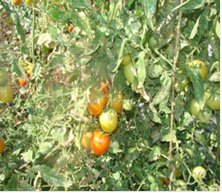
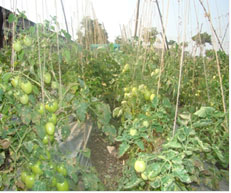
5. It is recommended to use drip irrigation at 80 % ETc with black polyethylene mulch during winter season for highest growth and yield of bitter gourd crop.
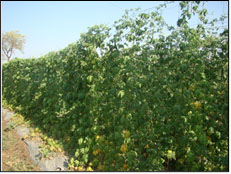
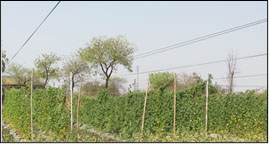
6. It is recommended to use drip irrigation at 80 % evapotranspiration replenishment with polyethylene mulch (silver colour and 50 micron thickness) for highest growth and yield of chilli crop.
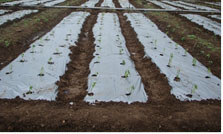
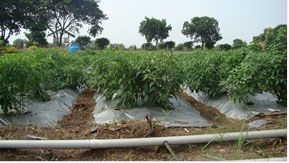
Publications
| Sr. No. | Authors | Title of book | Publication Year | Name of Publisher |
|---|---|---|---|---|
| 1 | M. U. Kale
M. S. Supe |
Fundamentals of Agriculture Engineering
(ISBN: 978-93-80428-52-9) |
2013 | Narendra Publishing House, Maliwara, Delhi |
| 2 | M. U. Kale
M. S. Supe |
Objective Agricultural Engineering
(ISBN: 978-93-80428-23-9) |
2014 | Jaya Publishing House,
Delhi (2nd Edition) |
| 3 | S. M. Taley
M. U. Kale K. A. Jadhao V.P.Ubarhande |
Hydrogeomorphometric Study of Akola District using Remote Sensing and GIS
(ISBN: 978-81-929196-6-9) |
2016 | Dr. PDKV, Akola and
NAE Programme, ICAR, New Delhi |
| 4 | M. U. Kale
M. S. Supe |
Introductory Hydroinformatics
(ISBN: 978-93-87973-09-1) |
2018 | New India Publishing Agency, Delhi |
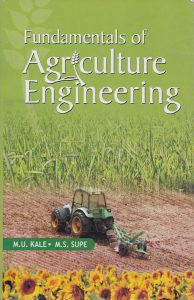
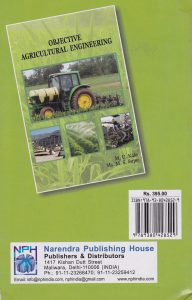
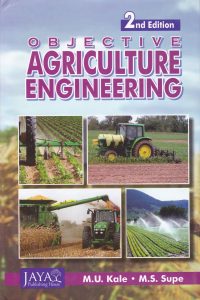
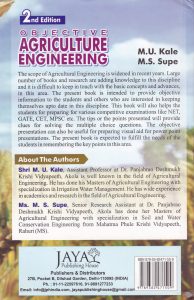
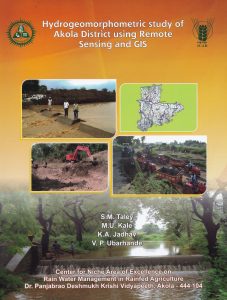
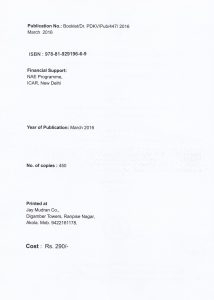
Contact Information
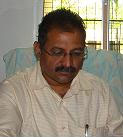 ,
,
Dr. S.B. Wadatkar
Head,
Department of Irrigation and Drainage Engineering,
College of Agricultural Engineering and Technology,
Dr. Panjabrao Deshmukh Krishi Vidyapeeth,
Krishi Nagar, Akola – 444 104 (M.S.)
Phone No. 94231290903
email: hdide@pdkv.ac.in, wadatkarsb@rediffmail.com
